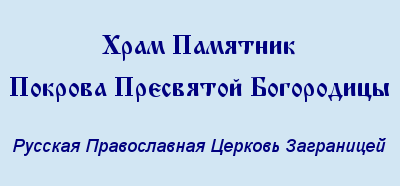Dear Brothers and Sisters,
Heartfelt congratulations to each of you with the feast of the Resurrection of the Lord, the forefeast of the Entrance of the Theotokos into the Temple, as well as the beginning of the Nativity Fast (Advent)!
Last week we noted that the most important thing a person can do before one’s death is to repent in a heartfelt manner of all one’s sins and commune of Christ’s Holy Mysteries. From ancient times it was considered most important to receive Communion before death. We also have to hold to this opinion, although there are also other rites and prayers that can be said at the time of death. There are several canons in the Book of Needs that are appointed to be read before and after the moment of death. (The Book of Needs is a liturgical book that contains the different services of needs, that is services that are served not on a regular basis, but only when the need arises. The services of baptism, marriage, and the funeral are all services of need and the texts of these services, along with others, are found in the Book of Needs.)
There is a very beautiful and expressive supplicatory canon to the Most-Holy Theotokos which is read before death. In this canon, the priest reads words that are as if said by the departing person. These words express many natural feelings that a person may have when their passing is imminent, including fear of death, personal helplessness, hope in the help and intercession of the Most-Holy Virgin and the angels, repentance. At the end of this canon, a prayer of absolution is read in the hope of the forgiveness of the sins of the dying person. It seems to me that this canon can have a very strong influence on the spiritual condition of a dying person and lead to deep repentance. These words are intended for the last moments of earthly life, but since it is difficult to guess exactly when that moment will be, the priest can be called earlier for these prayers to be read.
Usually immediately after death the first pannikhida (a memorial service at which we pray for the repose of the soul and the forgiveness of the sins of the newly-departed) is served. In the Book of Needs this first pannikhida is called “The Office at the Departure of the Soul from the Body.” This pannikhida differs in its rubrics and prayers from the usual pannikhida, although its meaning is one and the same. It is customary to have a pannikhida served not only on the day of death, but also on the third day after death in honour of the Holy Trinity and Christ’s Resurrection on the third day, on the ninth day because of our hope that the reposed will be in Paradise with the nine ranks of angels, and finally, on the fortieth day in remembrance of Christ’s Ascension to heaven on the fortieth day after His Resurrection. Afterwards, it is proper to serve a pannikhida on the anniversary of the death or on the namesday of the deceased. The merciful and man-loving Lord, for the sake of our prayers, can forgive the forgotten or unrepented sins of the departed; therefore, it’s important to remember the departed in our prayers.
Today, at the beginning of the Nativity Fast, let’s remember that we should keep this fast not only outwardly, that is in abstaining from meat and dairy products, but also spiritually. This means to repent of our sins, approach the chalice more often, pray, and give alms. Of course, if we are serious in this endeavour, we will be preparing not only for the feast of the Nativity of Christ, but also for our personal meeting with God after our own death.
priest Alexis







